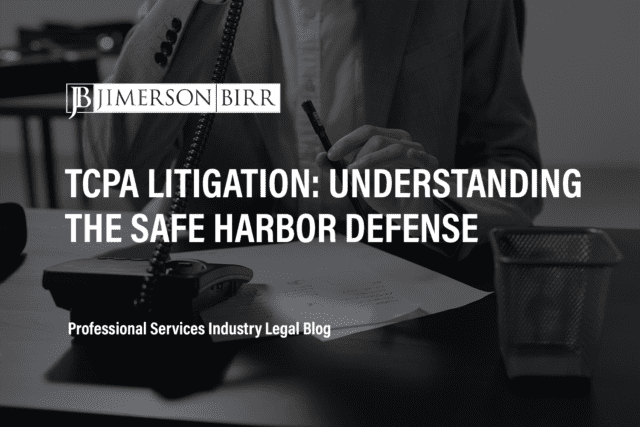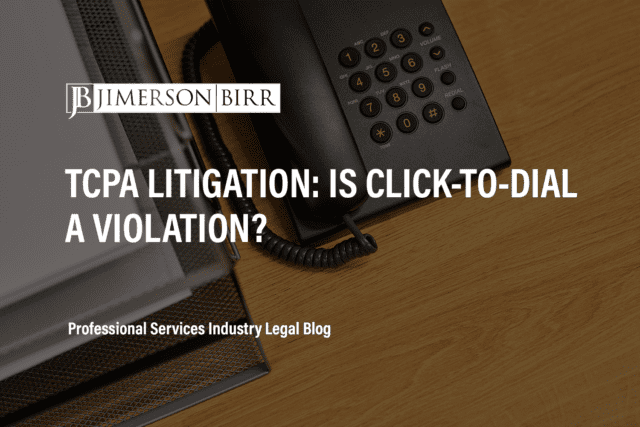What does TCPA class action defense litigation entail?
The Telephone Consumer Protection Act (TCPA) is a federal statute that protects consumers from unwanted telemarketing calls, faxes, and text messages. In Florida, TCPA class action defense is a litigation strategy that involves defending businesses against claims of TCPA violations. In these cases, plaintiffs allege that the defendant violated the TCPA by sending unsolicited communications to many recipients, often seeking substantial damages on behalf of the class members.
A key aspect of TCPA class action defense is challenging the plaintiff’s certification of a class. Attorneys representing the defendant may argue that individual issues predominate over common issues, making a class action inappropriate. For example, the issue of consent is central to many TCPA cases, and determining whether each class member provided consent may require individualized inquiries.
In Scoma Chiropractic, PA v. Dental Equities, LLC, a Florida federal court denied class certification in a TCPA case, finding that the plaintiff failed to establish commonality and predominance. In another example, the Eleventh Circuit Court of Appeals in Cordoba v. DIRECTV, LLC held that the plaintiff could not maintain a class action under the TCPA, as the court could not determine whether class members had provided consent without examining each circumstance.
Need help regarding TCPA defense litigation? Schedule your consultation today with a top TCPA defense litigation attorney.
Which laws and regulations apply to TCPA class action defense litigation in Florida?
In addition to the federal TCPA, Florida has regulations governing telemarketing practices. The Florida Telemarketing Act (FTA) and Florida Telephone Solicitation Act (FTSA) provide additional consumer protections, complementing the TCPA. These state laws often mirror the TCPA’s provisions but may include distinct requirements or penalties. Notably, the FTSA confers a private cause of action for plaintiffs, which the TCPA does not.
The Florida Department of Agriculture and Consumer Services (FDACS) enforces these regulations and maintains the state’s Do Not Call list. Therefore, Florida businesses must comply with federal and state laws when engaging in telemarketing activities.
TCPA class action defense attorneys in Florida must navigate the interplay between federal and state regulations when representing clients in these cases. Therefore, familiarity with TCPA and Florida-specific laws is crucial in crafting a strong defense strategy that addresses each jurisdiction’s unique requirements and potential penalties.
What are common issues regarding the TCPA that lead to class action litigation?
The following issues commonly lead to TCPA litigation:
- Lack of consent: A significant issue arises when businesses send unsolicited telemarketing calls, texts, or faxes without obtaining prior express written permission from the recipients.
- Revocation of consent: Consumers may revoke their consent to receive communications, and disputes can arise when businesses continue to contact them despite the revocation.
- Auto dialers: Using automatic telephone dialing systems, or auto-dialers, is a significant factor in many TCPA cases. Plaintiffs allege that businesses use auto-dialers to send prohibited communications.
- Do Not Call Registry violations: Businesses that contact individuals listed on the National Do Not Call Registry or Florida Do Not Call list may face TCPA class action lawsuits.
- Misleading caller ID information: Another issue arises when businesses use misleading or inaccurate caller ID information to disguise the origin of their calls, a practice known as “spoofing.”
- Pre-recorded or artificial voice messages: Sending pre-recorded or fake messages without proper consent can lead to TCPA class action litigation.
When a set of facts is appropriate for TCPA defense litigation, there are many paths a claimant may take. We are value-based attorneys at Jimerson Birr, which means we look at each action with our clients from the point of view of costs and benefits while reducing liability. Then, based on our client’s objectives, we chart a path to seek appropriate remedies.
To determine whether your unique situation may necessitate litigation, please contact our office to set up your initial consultation.
What TCPA class action claims do plaintiffs generally bring to court, and what are common legal defenses to those claims?
A plaintiff must satisfy procedural and evidentiary requirements to file a TCPA class action lawsuit in Florida. These requirements include demonstrating that the class is so numerous that the joinder of all members is impracticable, that common questions of law or fact exist, and that the claims or defenses of the representative parties are typical of those of the class.
Common claims that TCPA class action plaintiffs file in Florida courts include:
- Unlawful use of auto-dialers
- Sending unsolicited telemarketing calls, texts, or faxes
- Violations of the Do Not Call Registry
- Spoofing or misleading caller ID information
- Sending pre-recorded or artificial voice messages without consent
Common legal defenses raised against TCPA class action complaints include:
- Consent: Defendants may argue that the plaintiff and other class members provided prior express written permission to receive the communications.
- Revocation of consent not properly executed: Defendants may claim that the plaintiff and class members did not follow proper procedures or channels to revoke their consent.
- No autodialer use: A business may assert that it did not use an autodialer to send communications, which could exempt it from TCPA liability.
- Safe harbor provisions: Defendants may claim that they made a good faith effort to comply with the TCPA by implementing procedures to prevent violations, such as maintaining an internal Do Not Call list.
- A challenge to class certification: Defendants may contend that a class action is inappropriate because individual issues, such as consent or damages, predominate over common issues.
Please contact our office to set up your initial consultation to see what actions or defenses may be available for your unique situation.
What are effective measures to minimize the risk of class action litigation?
The following measures can help businesses mitigate the risk of TCPA class action litigation:
- Obtain express written consent: Ensure that prior express written permission is obtained from recipients before sending telemarketing calls, texts, or faxes.
- Implement a proper consent revocation process: Establish a precise and efficient method for recipients to revoke their consent and ensure sufficient employee training to handle such requests.
- Monitor compliance with Do Not Call lists: Regularly check the National Do Not Call Registry and Florida Do Not Call list to avoid contacting individuals who have opted out of receiving telemarketing calls.
- Avoid auto-dialers and pre-recorded messages: Refrain from using auto-dialers or sending pre-recorded or artificial voice messages unless recipients have provided appropriate consent.
- Maintain accurate and up-to-date records: Keep thorough records of consent, revocation requests, and internal Do Not Call lists to demonstrate compliance in case of a dispute.
Frequently Asked Questions
- How are damages calculated in TCPA class action cases?
In TCPA class action cases, damages are typically calculated based on the number of violations. The TCPA provides for statutory damages of $500 per violation, which can be increased to $1,500 if the court finds that the defendant knowingly or willfully violated the TCPA.
- Can a business be held liable for TCPA violations committed by a third-party marketer?
Yes, a business can be liable for TCPA violations committed by a third-party marketer if the marketer acts as the business’s agent or ratifies the marketer’s conduct. To minimize this risk, companies should closely monitor the actions of third-party marketers and require them to comply with the TCPA.
- How can a defendant challenge class certification in a TCPA class action?
A defendant can challenge class certification by arguing that the class does not meet the requirements under Rule 23 of the Federal Rules of Civil Procedure or the corresponding Florida rule. For example, a defendant may contend that individual issues, such as consent or damages, predominate over common issues, making a class action inappropriate.
Have more questions about a TCPA defense-related situation?
Crucially, this overview of TCPA class action defense does not begin to cover all the laws implicated by this issue or the factors that may compel the application of such laws. Every case is unique, and the laws can produce different outcomes depending on the individual circumstances.
Jimerson Birr attorneys guide our clients to help make informed decisions while ensuring their rights are respected and protected. Our lawyers are highly trained and experienced in the nuances of the law, so they can accurately interpret statutes and case law and holistically prepare individuals or companies for their legal endeavors. Through this intense personal investment and advocacy, our lawyers will help resolve the issue’s complicated legal problems efficiently and effectively.
Having a Jimerson Birr attorney on your side means securing a team of seasoned, multi-dimensional, cross-functional legal professionals. Whether it is a transaction, an operational issue, a regulatory challenge, or a contested legal predicament that may require court intervention, we remain tireless advocates at every step. Being a value-added law firm means putting the client at the forefront of everything we do. We use our experience to help our clients navigate even the most complex problems and come out the other side triumphant.
If you want to understand your case, the merits of your claim or defense, potential monetary awards, or the amount of exposure you face, you should speak with a qualified Jimerson Birr lawyer. Our experienced team of attorneys is here to help. Call Jimerson Birr at (904) 389-0050 or use the contact form to schedule a consultation.

We live by our 7 Superior Service Commitments
- Conferring Client-Defined Value
- Efficient and Cost-Effective
- Accessibility
- Delivering an Experience While Delivering Results
- Meaningful and Enduring Partnership
- Exceptional Communication Based Upon Listening
- Accountability to Goals











